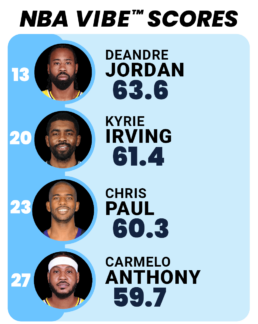Shortly before he died, U.S. Rep. and civil rights icon John Lewis said athletes are the new civil rights warriors.
“They have a great deal of influence,” said Lewis of athletes. “Sometimes history and fate just brings things together. And I think that is happening now.”
For decades, many athletes have started foundations and been active in various philanthropic projects. Recently, several athletes have found another way to make the world a better place: impact investing.
Chris Paul of the Phoenix Suns has been one of the most active impact investors. He was frustrated that his pure philanthropic efforts weren’t making the societal impact he was hoping for. He believes “philanthropy can be frustrating” at times.
Paul is one of several athletes, including tennis star Andre Agassi and basketball Hall of Famer Magic Johnson, who have invested in the Turner Multifamily Impact Fund, a type of private-equity fund focused on preserving affordable housing. Other investors in the fund include hedge fund billionaire Bill Ackman, the Rockefeller Brothers Fund, and actress Eva Longoria.
Paul has also joined fellow athletes Dwyane Wade and Carmelo Anthony in starting The Social Change Fund, which was created to help accelerate social change in communities of color and sustainably build a fair, equitable society. Some significant companies, including Goldman Sachs, are early investors in this fund.
Paul has also joined with fellow NBA players Kyrie Irving and DeAndre Jordan to make significant investments in Beyond Meat, a plant-based food company. Beyond Meat founder and CEO Ethan Brown says Paul’s “willingness to use his platform to make a difference is something that’s been evident to me from the very beginning of our relationship.”
An increasing number of today’s more socially-aware athletes are expecting their investments to lead to meaningful societal progress towards positive environmental, social and governance (ESG) outcomes – and they are willing to help lead the way.
At CoPeace Sport we help athletes (and coaches and sport organizations) maximize their ability to positively impact society. One of the tools we use is VIBE™ (Valuation of Impact Brand Equity), a proprietary tool designed to place a value on an athlete’s positive impact on society (e.g., efforts to address social and environmental problems).
An athlete’s VIBE™ score is only one aspect of his/her brand, but it can significantly impact an athlete’s brand equity as a whole. The VIBE™ score is based on publicly available information regarding an athlete’s socio-cultural and environmental impact on society, for example, ESG investments, impact activities on global/societal issues, philanthropic work, endorsements, athlete-produced content via traditional and social media, etc.
Impact investing has positively impacted the VIBE™ scores of the NBA players mentioned in this blog. The following are the players’ VIBE™ scores and their overall VIBE™ ranking among NBA players:

Paul has embraced impact investing because he likes the idea of positively impacting people and the planet while also earning a competitive financial return.
“That’s the fuel we need to bring in investors and reach even more communities and families,” says Paul. “When you combine a positive financial return with positive social impact, you can make a huge difference for people.”
Ken Reed is a Senior Communications Advisor at CoPeace. As a forward-thinking holding company, CoPeace is building a portfolio of carefully selected for-profit companies with measurable social and environmental impact. To learn more about impact investing, check out CoPeace’s Intro to Impact Investing.
Related Blogs
Nakeita Norman | Partner
June 2, 2025
Barbara Winter | Impact Director
January 14, 2025
Umadevi Gopaldass | Board of Directors
April 23, 2024









